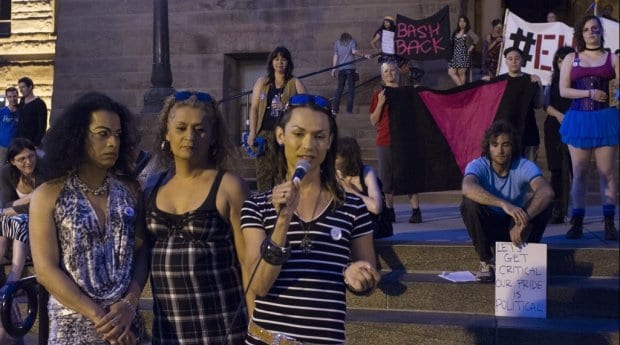In major cities, Pride has transitioned from a grassroots event to a gargantuan party. The shift toward corporate sponsorship, the near-requirement for local politicians to march and the movement of straight people from threatening presence to fellow celebrants, could all be seen as examples of progress.
According to filmmaker Kami Chisholm, however, what looks like hard-won achievements are actually examples of how we’ve detached ourselves from the movement’s activist underpinnings, throwing large swaths of our community under the bus in the process. It’s a subject she takes on in her feature-length documentary Pride Denied.
“One of the things I wanted to advocate for with this film is abolishing Pride organizations and most mainstream LGBT non-profits altogether,” Chisholm says. “They’re a waste of money. If I had my druthers, I’d disband Pride Toronto and have community-organized marches and celebrations that don’t involve corporations whatsoever.”
Currently in the editing phase, Chisholm’s film is composed of approximately 20 interviews with activists and theorists from Toronto and New York. Shot primarily over last year’s WorldPride, the piece includes footage of community events and a handful of news reports.
“Pride Toronto has a multi-million dollar budget,” she says. “At the same time, we have a crisis of homelessness among LGBT youth here and still don’t have an LGBT youth shelter. There are major gaps in health services for trans people that aren’t being addressed. There are so many ways people in this community are not being served and yet the best way use for these resources is to throw a party?”
The film also examines how philanthropy has shifted within the community over the last several decades, specifically in the fight for marriage in the US.
“I don’t have any problem with people who want to get married,” she says. “But I see a big difference between that and building non-profits organized and seeking funding around passing marriage, sucking up hundreds of millions of dollars. A big chunk of that money came directly from the pockets of LGBT organizations doing direct services in the community, many of which closed during this time in order for money to go to support these marriage campaigns.”
Along with groups like Against Equality, Chisholm sees the shift in gay activism toward conservative goals like marriage as problematic. Not because she takes issue with legal recognition of gay relationships or even the participation of queers in the institution. Rather, it’s because these achievements ultimately benefit a very small group.
“The opening ceremonies of WorldPride kicked off last year with a video tribute to Edith Windsor, the plaintiff in the case which brought down [the Defense of Marriage Act] in 2013,” she says. “What people forget about that case is that the principal argument was that she had to pay $360,000 in estate taxes when her partner died, which she wouldn’t have had to pay if their relationship had legal recognition. The reason she had to pay that money is because she’d inherited over $4 million. So the marriage fight was actually about getting rid of taxes for rich gay people. Labelling that as a fight for equality for all LGBT people, that’s what I have a problem with.”
Pride Denied: Homonationalism & the Future of Queer Politics
Watch the trailer
Donations toward the film’s completion can be made at:
https://altcinema.wordpress.com/films/pride-denied-homonationalism-the-future-of-queer-politics/


 Why you can trust Xtra
Why you can trust Xtra


